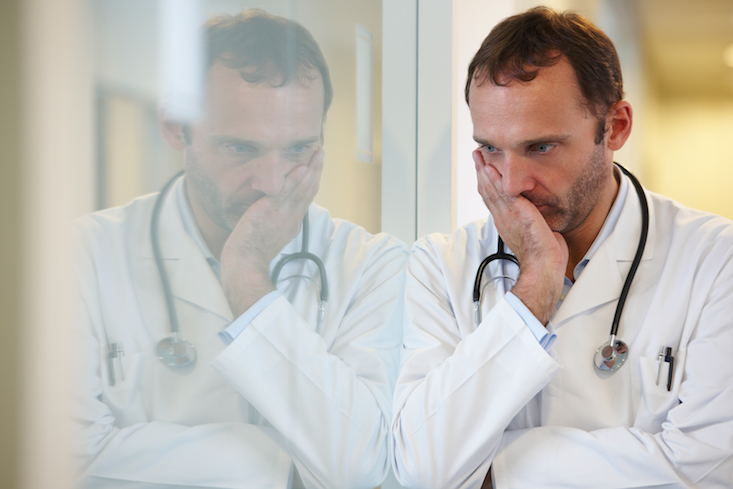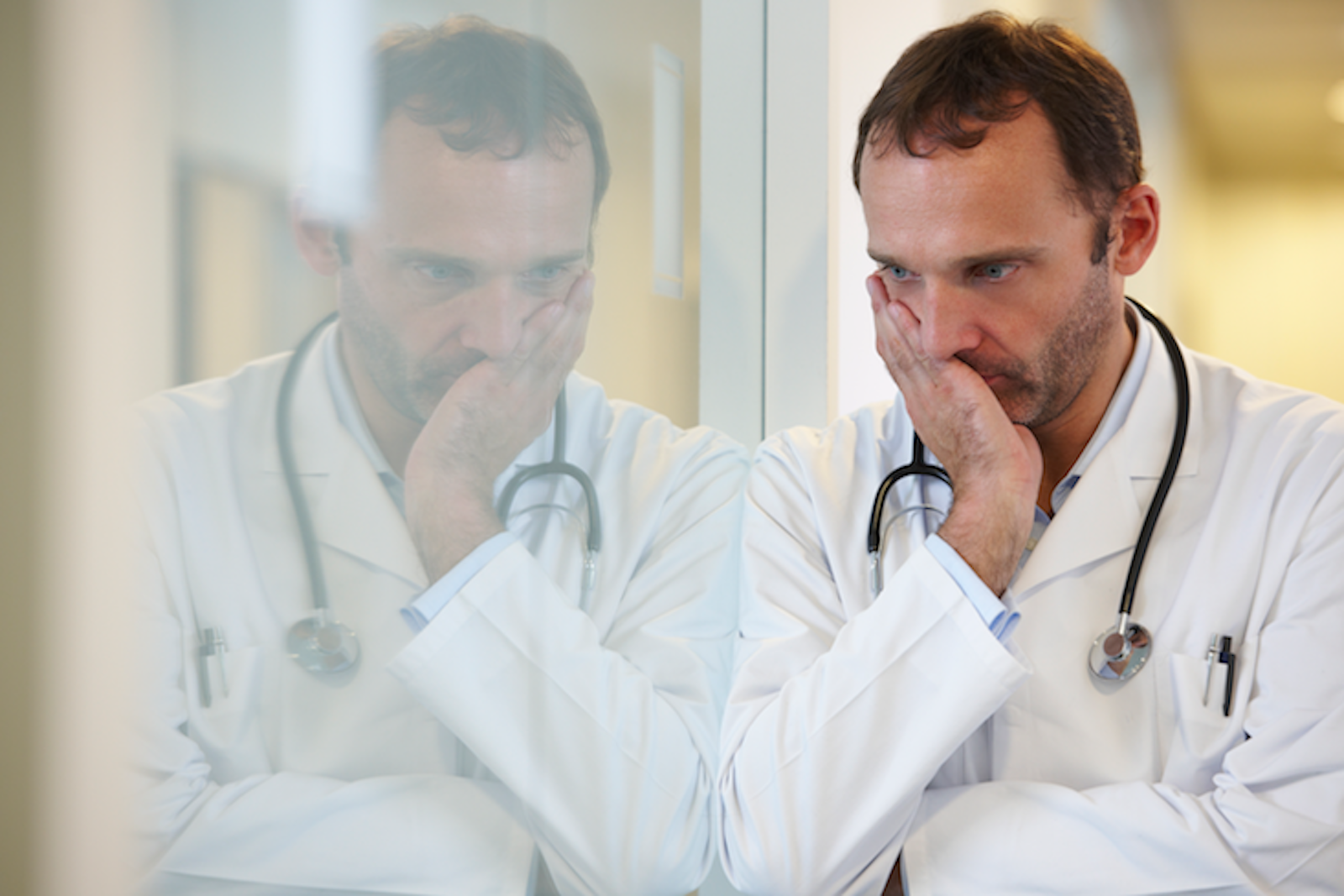
I watched a man die today. We were “rounding” when we were summoned to his room. He was struggling to breathe, and we knew that the breaths he was trying so hard to take were among his last. His weary body was worn out from widespread cancer and the rigors of therapy, and it was finally just giving out. It’s not like it wasn’t expected. He had made his peace and he was ready. But still, it was hard. His wife softly cried, “This is so surreal. How could this be happening?”
Later that day, we sat with a woman who had just had major surgery to remove a throat cancer. While the surgery was successful and she has an excellent prognosis, it comes at a cost; she can no longer speak, and she breathes through a surgically created opening in her neck. It’s been three weeks and her progress is slow. She is so discouraged. “I’ve had it,” she scrawled on her electronic communication board. “I can’t do this anymore. Take my feeding tube out. I am done. Get me hospice.” We sat with her. We listened.
By day’s end, I was weary, but what kept me going was thoughts of finally getting home, unwinding with my wife and daughter, and cooking that macaroni and cheese recipe I found in my favorite “journal,” Fine Cooking. As I trudged back to my office, I glimpsed at my emails and found a reminder regarding a two-hour teleconference about pain control guidelines that evening. My heart sank, my hungry stomach knotted. Should I let it go? But I said I would do it. Should I try to multitask and participate in the conference as I cook? (That never works, and usually ends with minimal participation in the call and a burnt meal.) I just wanted a little time for me and my family. Was I asking too much?
While what I experienced with these two patients today does not happen every day, it is well within the scope of an oncologist’s practice and speaks to the stress of our work. Add to that an endless list of newly diagnosed patients, the heartbreak of patients whose malignancies do not respond to therapy or recur after a hard fight, the delivery of difficult news, the dizzying array of laboratory and imaging studies to track, the unexpected calls from patients and families in distress, and the fights with insurance companies about access to care and medications; it is no wonder that balancing work and life is a challenge, that rates of burnout are high, and that a workforce shortage of oncologists looms.
As most of us say, we love our work—there is just too much of it.
Indeed, a 2014 study suggests that by 2025, there will be a need for 40 percent more oncologists in the U.S. That projected need is based on the fact that people are living longer, and hence more likely to be diagnosed with cancer, and those already diagnosed are also living longer thanks to new treatments and better supportive care. But based on current rates of retirement and new trainees entering the field, only 25 percent more oncologists are estimated to enter the field over that same time frame. Another study, from 2008, estimates that by 2020, there will be a shortage of approximately 2,500 to 4,000 oncologists in the United States. Why is it that we are falling short on meeting this demand for more oncologists?
One answer might be that this is just a symptom of a shortage in doctors overall. But evidence suggests otherwise. The healthcare system “isn’t undermanned,” wrote The New York Times, summarizing a 2014 report by the Institute of Medicine. “It’s inefficient.” Not only are doctors distributed geographically in a non-optimal way (rural locales are underserved) and relied on too often when midlevel practitioners, like physician assistants, would do, there’s also a generalist-specialist practitioner problem. The U.S. ranked 24th of 28 countries in the amount of general practice doctors it has per 1,000 people, but 11th for specialists. “When you compare the percentage of physicians who are generalists with those who are specialists,” according to The Times, “the United States beats only Greece among developed economies.”
Yet, even without an overall shortage of doctors, several subspecialties in internal medicine are projected to have, by 2025, an inadequate amount of practitioners, especially oncology, according a 2016 report.
Another answer might be burnout. Burnout is emotional exhaustion, depersonalization (treating patients as objects), and a sense that one’s work is not that important. Burnout is not unique to oncology and, indeed, not unique to this era. In an illuminating lecture titled “I am their physician: Dr. Owen J Wister of Germantown and his too many patients,” Steven J Peitzman writes how Dr. Wister in his late 19th century practice made rounds by horse and buggy to countless homes in eastern Pennsylvania. He was loved by his patients, but his dedication took its toll, as he writes: “I am utterly exhausted body & mind. My sick list is forty this day, not all to be seen every day, but several times a week so that it ranks about thirty people daily, some of them twice, and as many reside at considerable distances you may imagine the fatigue I have encountered.”
Dr. Wister went on to have a “nervous breakdown,” never to engage fully in practice again. We are no more immune to such exhaustion than Dr. Wister, and indeed, numerous studies examining burnout in oncologists have documented rates as high as 25-35 percent among physicians in our field. Not only does this result in oncologists leaving the field or retiring early, but it can affect oncologists’ performance and result in poorer quality care. I must confess that there are days I have felt like Dr. Wister. There are some days when the demands—the needs of my patients, the need to make weighty decisions, the need to convey hard news to hopeful people—is just crushing. My wife, ever trying to keep me on an even keel, reminds me when I am tipping over, calling me, “Dr. Korones and his too many patients.”
Long hours should no longer be a badge of honor.
In 2014, the American Society of Clinical Oncology (a leading professional society for physicians caring for people with cancer) conducted a study examining burnout and satisfaction with work-life balance among U.S. oncologists. Over a thousand oncologists completed the survey and the results are unsettling: Just 33.4 percent of the oncologists were satisfied with their work-life balance. They also found that women and those spending more time in patient care (versus research and administrative work) had even higher rates of work-life balance dissatisfaction. Oncologists also reported less satisfaction than members of any other medical subspecialty, and those who were unhappy with their work-life balance, not surprisingly, were more likely to experience burnout and more likely to cut back their hours or retire altogether.
Don’t get me wrong; oncologists don’t hate the work they do. On the contrary, most have great passion for what they do, and the 68 percent overall survival rate of adults with cancer speaks to the many successes and the immense gratification of guiding patients and families through one of the most frightening, life-changing times in their lives. As most of us say, we love our work—there is just too much of it.
So what can we do to reverse this trend, to lure young trainees into this wonderful, albeit challenging specialty, hang on to the gratifying part, and reduce some of the stress? Systemic changes need to happen. Hospitals need to hire more support staff—nurse practitioners, physician assistants, and psychosocial staff. Long hours should no longer be a badge of honor, but rather, should be strictly limited: a sleep-deprived physician is not what a cancer patient needs. Another important systemic fix is teaching us how to take care of ourselves and importantly, how to recognize when one of our colleagues is hurting.
Self-care, as it is called, is a high priority for the ACGME (Accreditation Counsel for Graduate Medical Education), the rigorous certifying body that identifies what trainees must learn to become a doctor or subspecialist. Our trainees are now taught warning signs of fatigue and depression, debriefing sessions around difficult cases are happening more often, and emphasis is placed on learning communication skills. At our own center, we have a bimonthly seminar with our trainees called “Narratives in Oncology” where we discuss the human side of medicine, our guilt, our vulnerabilities, the patients and families who challenge us in a personal and professional way.
We cannot depend entirely on the system to keep us healthy and happy. We have to take some responsibility for ourselves. We need to remember that the work is never done and that there is a time to stop, to recharge. Time with family (or friends) matters. It’s not that hard to tuck our cellphones into our pockets and purses and remove the temptation to check our emails and our patients when we are off-duty. It’s also not that hard to turn off our pagers. That is why we have partners! And when was the last time we went on a real vacation, completely disconnected from patient care and electronic tracking of hospital goings-on? We can also take care of ourselves by reading, by writing, by taking courses on stress reduction, and by getting involved in international medicine, to give us perspective. Self-care is not some touchy-feely luxury in medicine. It is vital for the health of our patients, our colleagues, and ourselves.
The family of my patient whose last breath we witnessed today thanked us for being there, for comforting them in their time of great sorrow. As for the woman who wanted to stop everything and go on hospice, we listened and acknowledged her distress and worked with her to find ways to relieve it. By the next day, her spirits had lifted, and she is now well on her way to recovery. It doesn’t always work that way. There are always challenges; there will always be sadness and heartbreak. Each of us in oncology has to find our way and develop the camaraderie and support and coping mechanisms that help us to put one foot in front of another during the hard times.
Me? I went home that night, kissed my wife and daughter, and cooked them one fine dish of macaroni and cheese. I felt twinges of guilt for missing my meeting, to be sure. But those twinges quickly dissipated with the first bite of that succulent combination of macaroni, Fontina cheese, creamy sauce, and prosciutto. I am ready to go to work tomorrow.
David Korones is a pediatric hematologist/oncologist and palliative care physician at the University of Rochester Medical Center in Rochester, New York.
This article was originally published on Cancer Focus, in partnership with the American Society of Clinical Oncology, in April 2017.






























